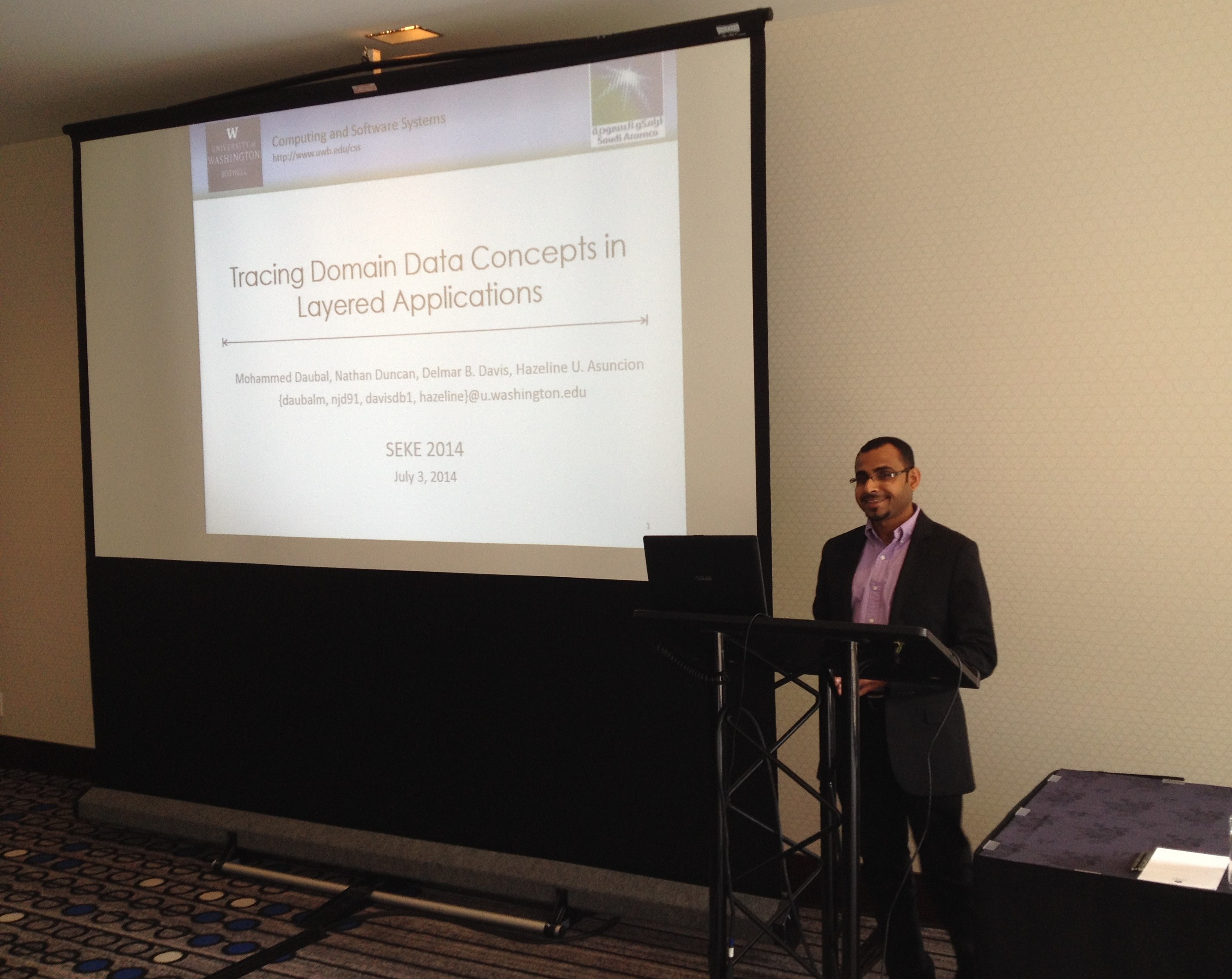Graduate student alumnus Mohammed Daubal, who was an international graduate student sponsored by Saudi Aramco, examined using domain data concepts as a means of connecting heterogeneous implementation files (e.g. source code, SQL statements, configuration files) in layered architecture systems. This approach, referred to as DDC Tracer, creates a traceability link chain of implementation files from the back-end database to application server and to user interface. Mr. Daubal presented his work at the 26th International Conference on Software Engineering and Knowledge Engineering (SEKE) at Vancouver.
Here’s a first-hand report from Mohammed:
Presenting in a conference is something I never expected during my graduate studies. However, now, as a master’s student, the ability to present at the International Conference on Software Engineering and Knowledge Engineering (SEKE) 2014 became one of my most beneficial experiences during my study at Computer Science & Software Engineering at University of Washington Bothell. It represents the culmination of many hours of research work, thought, and discussions with my research group and colleagues at Aramco.
Before coming to the school, and after I got the scholarship from my employer, Aramco, I took the advantage of the university website to seek out my research advisor. I was lucky to be connected and share my ideas with Professor Hazeline Asuncion, leading the Provenance and Traceability Research Group. Thus, at the beginning of my graduate studies at the school, I held many meetings with her to identify my research problem and to plan my thesis work. She informed me that presenting our work at a highly recognized conference is one of many goals of doing my master thesis. With this in mind, and during the timeframe, I spent one and half years of research with my team to publish our paper “Tracing Domain Data concepts in Layered Applications” at SEKE 2014.
After the acceptance notification, it was the time to develop the presentation. My research advisor taught me what to expectation from my audience and how to hold their attention throughout the presentation (e.g. clarifying ideas with figures and less text, slowing down to emphasize key points, and repeating them frequently during the presentation. Furthermore, I had the opportunity to practice the presentation with the research group to get the feedback from other students who are in the same field in order to improve the presentation style and delivery, and also to prepare for answering questions.
At the conference, it was the first time to meet participants from all over the world and to get familiar with the conference atmosphere. For example, all the presentations are divided under particular sessions according to the topic. This helped me choose the sessions that interest me to learn about cutting edge research; moreover, meeting people who examine similar issues. During the conference’s breaks, I met many master’s students and talked about their school and department, their research projects and similar issues in the field. Thus, I found that it is common for master students to present their research in an academic conference.
I was a little bit nervous presenting in a conference because experts in the field will analyze the ideas I present. With a lot of practices and listening to other presentations in the conference, I felt confident, more knowledgeable, and excited to present our research when I realized it is a significant idea. Moreover, attending different sessions at the conference allowed me to know more people and to discuss my research project with others. As a result, I became familiar with the tone of the conference and anticipating the audiences’ questions.
In addition, after the presentation, I had a chance to discuss with some individuals in the audience who were interested for seeking further information. This helped me to build up network for future collaboration, and got good feedback and ideas for future avenues.
In general, I enjoyed attending the conference and it was a great opportunity to introduce myself to the community and to meet innovative people in the field, share ideas, and be confident with public speaking at a conference. Finally, it is important to remember that sharing one’s accomplishment saves another from reinventing the wheel and avoiding the difficulties that have been experienced by others.

